Jacob Blake spoke with Joe Biden from hospital bed during Kenosha visit
KENOSHA, Wis. - Democratic presidential nominee Joe Biden began a visit to the battleground state of Wisconsin on Thursday by meeting with the family of Jacob Blake, the Black man whose shooting by a white police officer sparked days of sometimes violent protests.
Biden spent more than an hour in private with Blake's father, Jacob Blake Sr., his siblings, and one of his attorneys, B’Ivory LaMarr. Blake’s mother Julia Jackson and another attorney, Ben Crump, joined by phone.
Crump said the younger Blake participated in the meeting by telephone “from his hospital bed.” Blake, 29, shared the pain he is enduring and Biden commiserated. The family has said that Blake is paralyzed from the waist down after being shot seven times in the back by police as they tried to arrest him on Aug. 23.
Crump said Blake’s mother led everyone in prayer for his recovery.
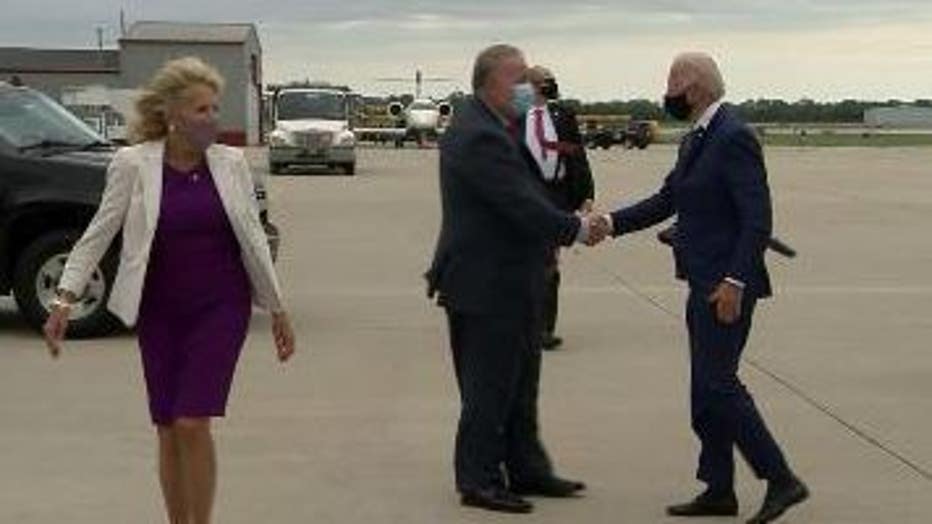
Brian Mcpartlin, campaign staffer, greets Joe Biden in Milwaukee
Biden followed his meeting with Blake's family and representatives with a community discussion at Grace Lutheran Church in Kenosha. The gathering included business and civic leaders and at least two representatives of law enforcement.
At the church, Biden said of Trump: “No president’s ever going to say ‘they’re very fine people on both sides.’ No president has ever said anything like that ... It legitimizes the dark side of human nature.” Biden was referring to Trump's comments after a 2017 “Unite the Right” rally in Charlottesville, Va., turned deadly.
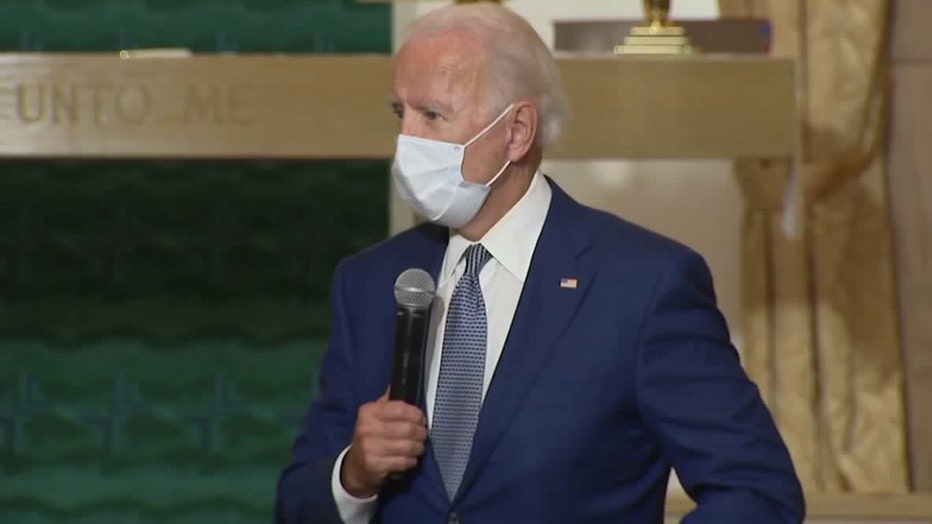
Joe Biden speaks at church in Kenosha
The Rev. Jonathan Barker, pastor of the church, opened the meeting with a prayer asking for “justice for Jacob Blake” and for God to “anoint” a national leader in November who will “seek justice, love mercy ... and love their neighbor.”
Biden, a practicing Catholic, ended the prayer making the sign of the cross. He then heard from Kenosha residents discussing the need to address systemic racism so that society — including commerce — will function peacefully. “I look at the buildings in our community that are gone,” said Barb DeBerge, owner of DeBerge Framing & Gallery, which still stands. “I just I don’t think I really grieved as much as I should because being a business owner, I have to keep going, I have to keep working.”
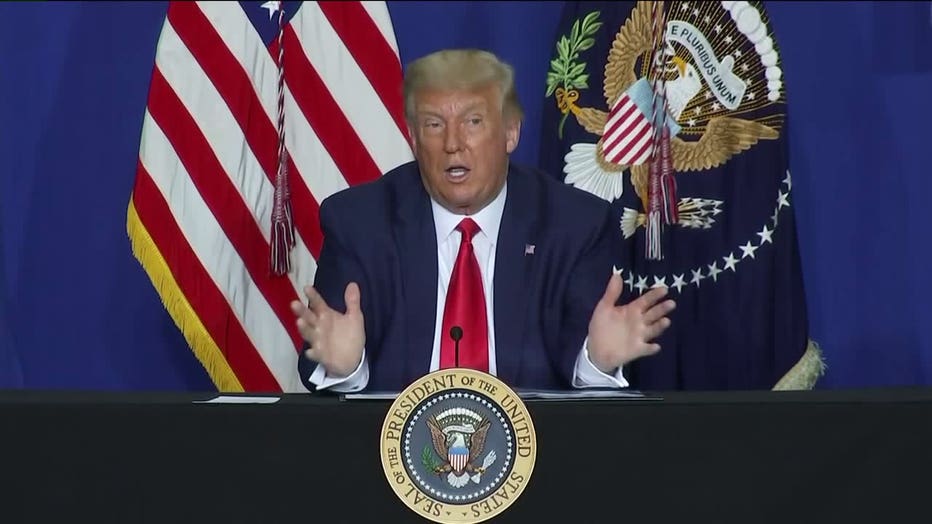
President Donald Trump visits Kenosha
The trip, Biden's first to Wisconsin of the general election campaign, is intended to draw sharp contrasts with President Donald Trump. Biden is emphasizing an argument that he’s a unifying figure, able to lead the nation through a reckoning with systemic racism along with the coronavirus pandemic and its economic fallout.
Trump didn't meet with the Blake family when he visited Kenosha earlier this week.
Two months before Election Day, the trip presents Biden both opportunity and risks. He's promised throughout his 2020 campaign that he can “unify the country” and find consensus even where it’s not readily apparent. That theme started as an intentional contrast with Trump, who thrives on conflict. The distinction has sharpened over a summer of nationwide protests. Most have been peaceful, but some of them, as in Kenosha, turned violent and destructive.
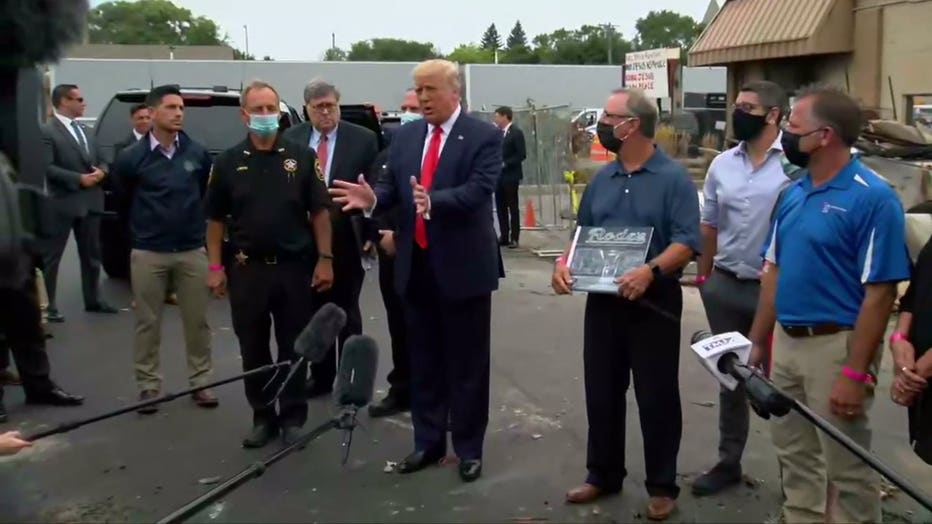
President Donald Trump visits Kenosha
Reflecting that his trip comes amid the COVID-19 pandemic, Biden wore a mask as he arrived in Milwaukee. Yet he broke his usual health protocols to shake hands with a campaign staffer.
Kenosha was calm ahead of Biden's visit. By midday, a small group of Biden supporters, some Black Lives Matter activists and a Trump supporter had gathered at a city center park that had been a focal point of demonstrations for days. When the president visited Kenosha on Tuesday, a few hundred pro- and anti-Trump protesters convened at the spot.
“No one’s perfect,” said Michelle Stauder, a 60-year-old retired Kenosha school teacher sitting on a barricade erected earlier and clutching a Biden-Harris campaign sign. “But I’m excited about Biden. And I like that he’s here spreading the word of peace and rebuilding.”
Kenneth Turner stood nearby with a Trump-Pence yard sign under his arm. “Everyone is blaming Trump for everything,” the 50-year-old Kenosha man said. “But problems here have been around a long time before Trump.”
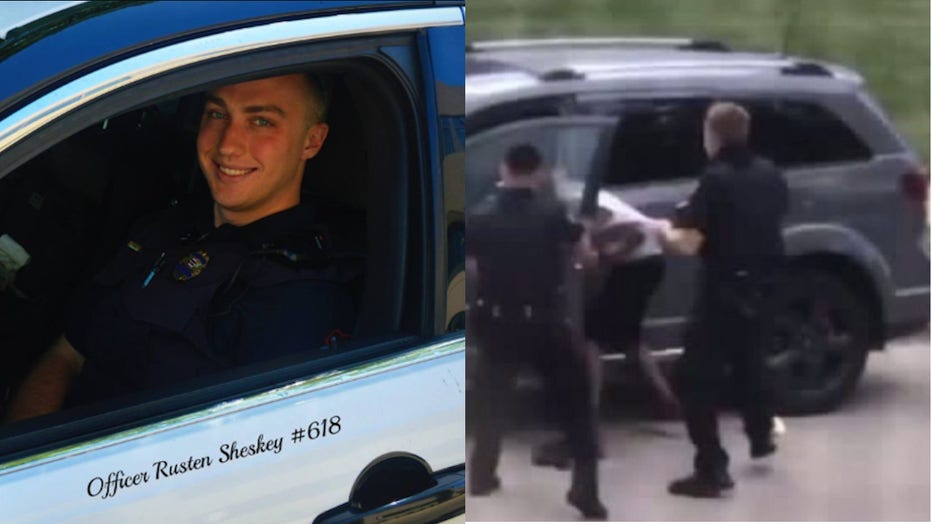
Kenosha Police Officer Rusten Sheskey, Jacob Blake
Wisconsin Gov. Tony Evers, a Democrat, said Thursday that he'd asked both Biden and Trump not to visit. “I would prefer that no one be here, be it candidate Trump or candidate Biden,” Evers said in a news conference. Biden is a white man propelled to the Democratic nomination by Black voters. Since the May 25 death of George Floyd, a Black man killed by a white Minneapolis police officer, Biden has called for an overhaul of U.S. policing and embraced a national conversation on racism. That was a factor in Biden selecting California Sen. Kamala Harris as the first Black woman to join a major party presidential ticket.
Trump, meanwhile, has countered with sweeping condemnations of protesters, an absolute defense of law enforcement and denials that Americans with black and brown skin face barriers that whites do not — moves aimed at his overwhelmingly white political base.
During his own Kenosha trip Tuesday, Trump toured damaged buildings and discussed ways to quell unrest with law enforcement officials. Trump was greeted by supporters who occasionally mixed with and yelled at Black Lives Matter organizers.
Trump is scheduled to hold a campaign rally Thursday evening in Pennsylvania, another key Rust Belt battleground. His campaign manager, Bill Stepien, said Biden's visit to Kenosha was inappropriate, arguing Trump went because he is president and that Biden is only “injecting politics into a really serious situation that president helped solve.”
Biden has, in fact, repeatedly denounced violence, from a June 2 speech after Floyd’s death up to a Monday address that his campaign quickly turned into a one-minute digital and television ad. The spot is part of a $45 million ad buy. English and Spanish language versions are circulating on national cable networks and in local markets across Arizona, Florida, Michigan, Minnesota, Nevada, North Carolina, Ohio, Pennsylvania and Wisconsin.
The ad's necessity highlights Biden’s tightrope as he discusses the complexities of the moment while running against a president who governs and campaigns in loud absolutes.
Biden on Wednesday repeated that “to engage in violence — burning, looting, the rest — in the name of protesting is wrong. And that person should be held accountable for their actions.” But he stood by First Amendment guarantees that “protest is a right.”
He also praised law enforcement, saying "the vast majority of police officers are good, decent, honorable women and men. They put on that shield every morning. They have a right to go home that night safely — the vast majority.”
Biden wants to overhaul policing — not to “defund the police," but to require local forces to agree to certain best practices to get federal funding. He wants to spend more on services, such as mental health counseling, to ease social problems that fall to police to handle, sometimes with violent consequences.

